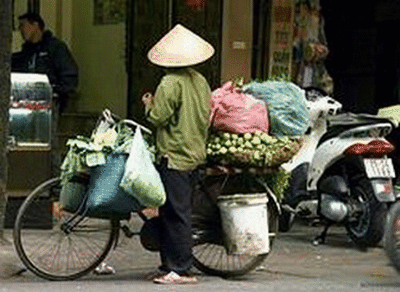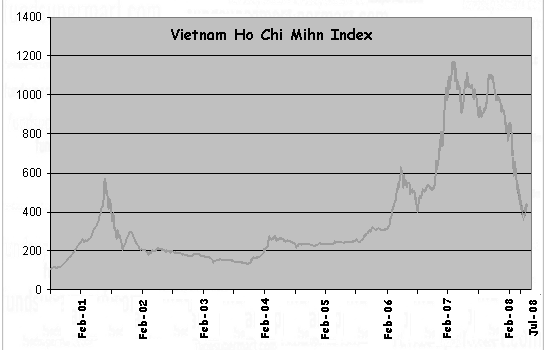|
Posted February 5, 2010
Vietnam admits rigging gold as a currency intervention
HANOI, Vietnam, Friday February 5, REUTERS --
The price of gold in Vietnam dropped by more than 5 percent on Friday from the
day before after the central bank told the country's biggest maker of gold bars
to sell bullion to help narrow the gap with world prices.
Saigon Jewelry Co. (SJC) sold 28,000 taels of gold (33,880 ounces) on Friday
compared with 10,000 taels on Thursday, a company official said by telephone
from Ho Chi Minh City.
"The state bank has asked SJC to sell gold so that prices can be stabilised in
line with the world market," said the official, who declined to be identified.
Gold was quoted at around 24.9/25 million dong ($1,353.60/$1,359) per tael at
around 1000 GMT, about 5.4 percent lower than the 26.37/26.43 million dong
quoted late on Thursday, according to SJC's website (www.sjc.com.vn).
Gold prices in Vietnam have been higher than world prices because imports are
controlled and taxed, and sellers charge a premium for the commodity, which is
widely used as a second currency and reserve of wealth.
On Friday afternoon, after the price fell, gold in Vietnam was still higher than
world prices by about $63 per ounce, or 6 percent.
A central bank statement later confirmed that it ordered SJC to sell gold and
said it would "apply necessary supportive measures" during the process of
stabilising gold prices. It did not give further details.
On the world market, gold prices hovered above three-month lows on Friday, a day
after after posting their biggest one-day loss since 2008, with investors wary
of taking risks amid mounting sovereign debt fears in Europe.
The amount of gold SJC sold on Friday was relatively large. By comparison, on
slow trading days it sells 4,000-5,000 taels, the official said. When gold
prices soared to around 29 million dong per tael, in early November, SJC was
also ordered to sell bars and it offloaded 16,000 taels per day, he said.
He did not say how long the firm would sell at high volumes.
The nation is preparing for the Lunar New Year, or Tet, its biggest festival of
the year. The government has committed to keeping prices stable and currency
flowing during the period when there is traditionally a surge in consumption.
The central bank's decision also follows government orders to close all of the
country's roughly 20 gold floors, which deal in non-physical gold and allow
margin trading, and overseas trading accounts.
Vietnam's currency, the dong, is closely linked to the gold market. When gold
prices soared in November, for instance, the dong sank on the black market
because gold smugglers were buying dollars to take across borders to purchase
new gold. (1 tael = 1.21 troy oz; $1 = 18,469 dong)
Posted November 12, 2009
Vietnam has lifted all restrictions on Gold imports. (We
remember that on publishing the Article below on Vietnam, the high inflation
rate and that they had restrictions on Gold imports we received some emails from
angry Vietnamese.)
Traditionally, the Vietnamese use Gold for
savings, jewellery and real estate transactions but when inflation is high, many
choose gold to hedge against inflation.
HANOI, Nov 11
(Reuters) - Vietnam's central bank on Wednesday lifted a 1-1/2-year-old ban
on gold imports in a bid to stabilize the market after a sharp rise in prices
helped drive the country's dong currency to a record low.
"The State
Bank of Vietnam will allow gold imports with a volume sufficient to intervene
in the market in order to stabilize the market, combat speculation and prevent
an impact on the interests of the people," the central bank said on its Web
site, www.sbv.gov.vn.
Five or six
companies would be allowed to import unlimited quantities of gold, state-run
news Web site VNexpress.net quoted State Bank of Vietnam Governor Nguyen Van
Giau as saying on Wednesday afternoon. He did not give details or a timeframe.
The ban on
gold imports since May 2008 led to a gap between domestic and international
prices, and recently traders say that spread, plus the rise in gold prices
globally, triggered a surge in demand for dollars.
"This
morning the prices and the market went crazy, the worst time in my 20 years of
trading," an owner of a gold shop in Hanoi's downtown district of Hoan Kiem
said.
"Prices
collapsed this afternoon and the decision on gold imports will certainly help
control the situation."
By early
afternoon on Wednesday the dong hit 19,800 per dollar -- about 7 percent lower
than the rate a week ago -- before rebounding to around 19,000.
Posted April 16, 2009
Vietnam shows interesting in monetary
developments. The local currency, the Dong, is not an internationally
exchangeable currency and is moving in the direction of the Zimbabwe dollar.
The first thing
that made an impression was a question on the Vietnamese arrival form.
Immediately following the normal question: "Are you carrying more than $10,000
in cash or convertible currencies?" was another question: "Are you
carrying more than 300 grams of gold? If so, list the gold that you are
carrying."
Virtually
all trade in Vietnam can be conducted in either Dong or in US Dollars. Every
Vietnamese can instantly quote the price in either currency. The locals spend
Dong while US Dollars are hoarded. Gresham's Law is alive and well in Vietnam.
The Vietnamese are also well versed in the benefits of holding gold as "good"
money. This
article suggests that the Vietnamese people hold
a total of 700 tons of gold, a huge amount for such a small country.
Posted July 27, 2008
Zimbabwe is still number one
"inflation" story of the year; however Vietnam is starting to write a similar
one. It comes as no surprise that another dollar-linked or semi-pegged currency
has collapsed vis-ŗ-vis gold. As usual the weaker economies have to give in
before the stronger ones do. Which one will be next!?

Vietnamís 27 % inflation level has
yet to reach the vertiginous levels we see in Zimbabwe but the country is
experiencing every problem that causes a rush into precious metals. Interest
rates are over 8% and rising, the stock market
was down every day since May, and official unemployment has more than doubled and reached
5.1% this year (Spain has 10,2% unemployment). The real spending power of
household has drastically declined. The Vietnamese stock market index has collapsed
all the way to the base from where the parabolic rise started (200) and Real
Estate is coming down in sequence.

In Vietnam, people are reacting in a
different way than in Zimbabwe. The main reason being that the population in
Zimbabwe had and has no or little access to Gold. Vietnam
(Indochine)
was a French colony
and it has, like all colonies have, inherited the French way of living. French
people traditionally jumped into gold in times of economic and financial
hardship. They were over and over again trained by historyÖand have not
forgotten their lessons.
Hence it is no surprise Vietnamís
economic and monetary problems have sent its people fleeing into gold. Not gold
stocks... but physical gold bullion. They're hoarding it and hiding it from
their government.
Only about 10% of what Vietnamese hold
in Gold has been deposited into banks (which actually pay 2.5% interest on
gold). The remaining 90% is likely under mattresses or hanging around the
owner's neck.
The trend toward gold is spilling
into other financial areas. After a long period of quoting land prices in
Vietnamese dong (the nation's currency), landlords are now setting prices in
gold in order to avoid the devaluation.
The Vietnamese economic miracle,
averaging a stunning 7.3% GDP (gross domestic product) growth rate this decade,
is abruptly coming to an end. Austrian economists would classify the
Vietnamese economy as a HOCG economy. What happens here and now is
completely in line with the theory as explained by Ludwig von Mises.
Ironically, and as expected, since
June, the Vietnamese can no longer buy gold. Officially, the government claims
this new policy is to temper booming imports, which resulted in a record trade
deficit for the first half of 2008.
Next step, as Vietnam continues to
lose control on inflation and the economy, gold confiscation becomes a real
possibility.
Note:
1. Vietnam Suspends Gold Imports,
Follows FDR's Great Depression Lead
- July 04, 2008 - by Eric Roseman: It seems Vietnam just borrowed a page
from the U.S. financial-history books - by suspending all gold imports in June.
This marks the first time a Southeast Asian country has ever barred gold imports
during skyrocketing inflation, soaring interest rates and an overvalued currency
- the Vietnamese dong.
2. Vietnam's communist
authorities have temporarily suspended all gold imports in a bid to tackle
the country's spiraling trade deficit and help support the depreciating local
currency, the dong. With Vietnamese investors rushing into gold as a hedge
against skyrocketing inflation, Hanoi - which sets an annual quota for gold
imports - has withdrawn licenses for further imports, traders said yesterday.
3. A remark on an article
written in Seeking Alpha stroke my attention. The total registered FDI
(Foreign Direct Investment) for the first 7 months has been well over over $ 45
bn.
I did some research and the result is very interesting. Milton Friedman wrote
the early stages of a hyperinflation (Weimar, US civil war) were accompanied by
a huge speculative influx of foreign capital. This momentarily can stabilize the
equity and credit markets. It is to be seen as a result of false signals given
by the Fractional Reserve Banking and the resulting misallocation of funds.
However, after the initial benefit, the influx of foreign capital helped to
destabilize the system: at first, foreigners are persuaded that the currency
would subsequently appreciate. However, as the inflation goes on. expectations
are reversed, the inflow of capital replaced by an outflow, and the currency
depreciates more rapidly. This is what happened in Germany and this is
what will probably happen in Vietnam too.
Click here for the link to the article...
>back to Inflation
Goldonomic, Florida, USA -
 +1
(772)-905-2491
+1
(772)-905-2491 |